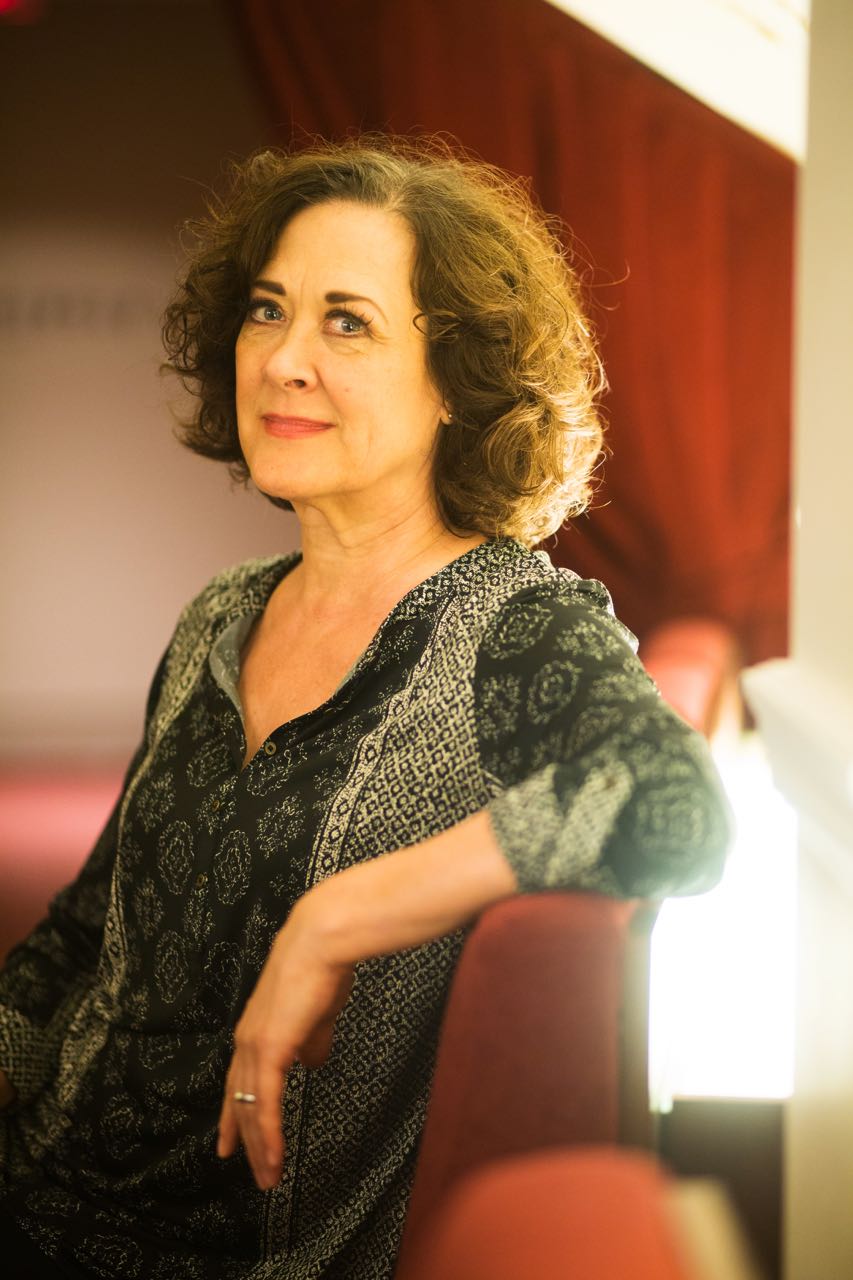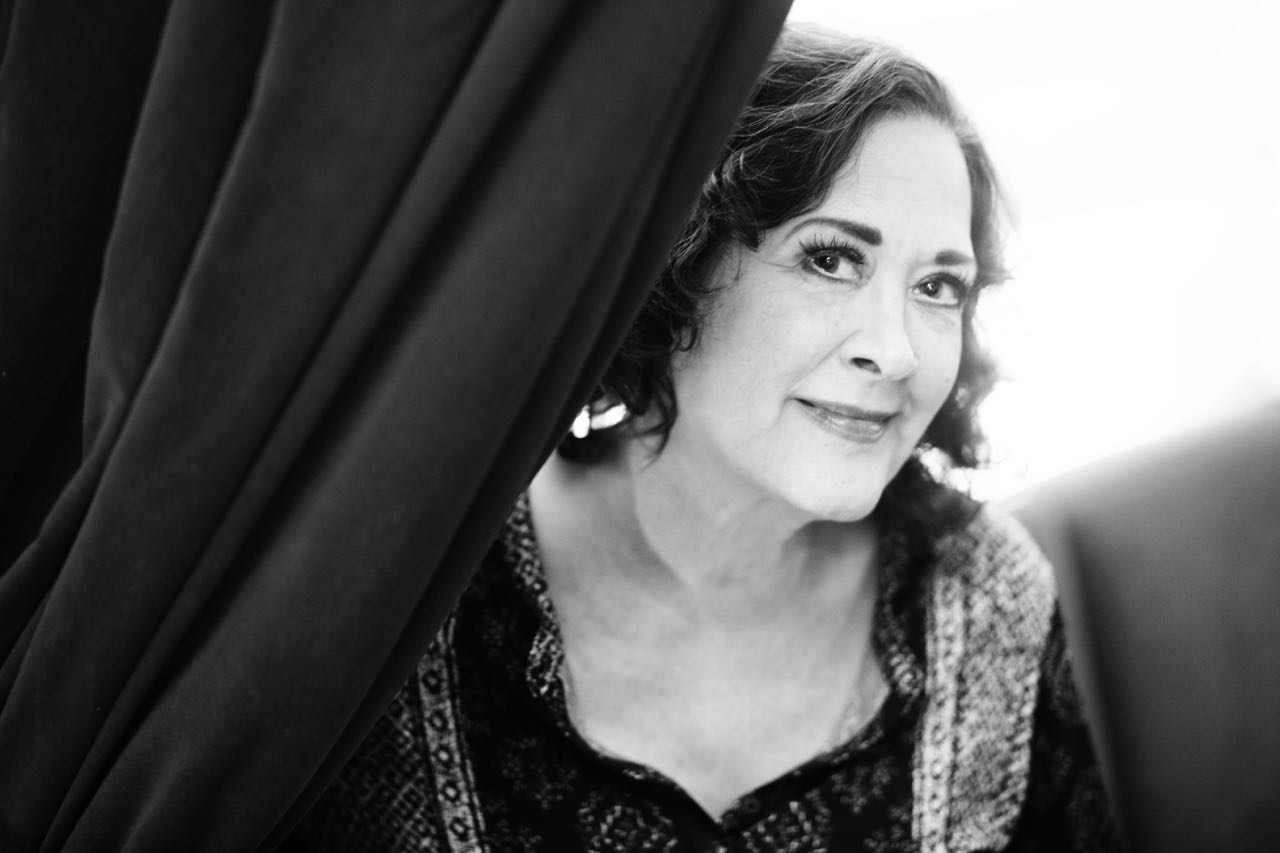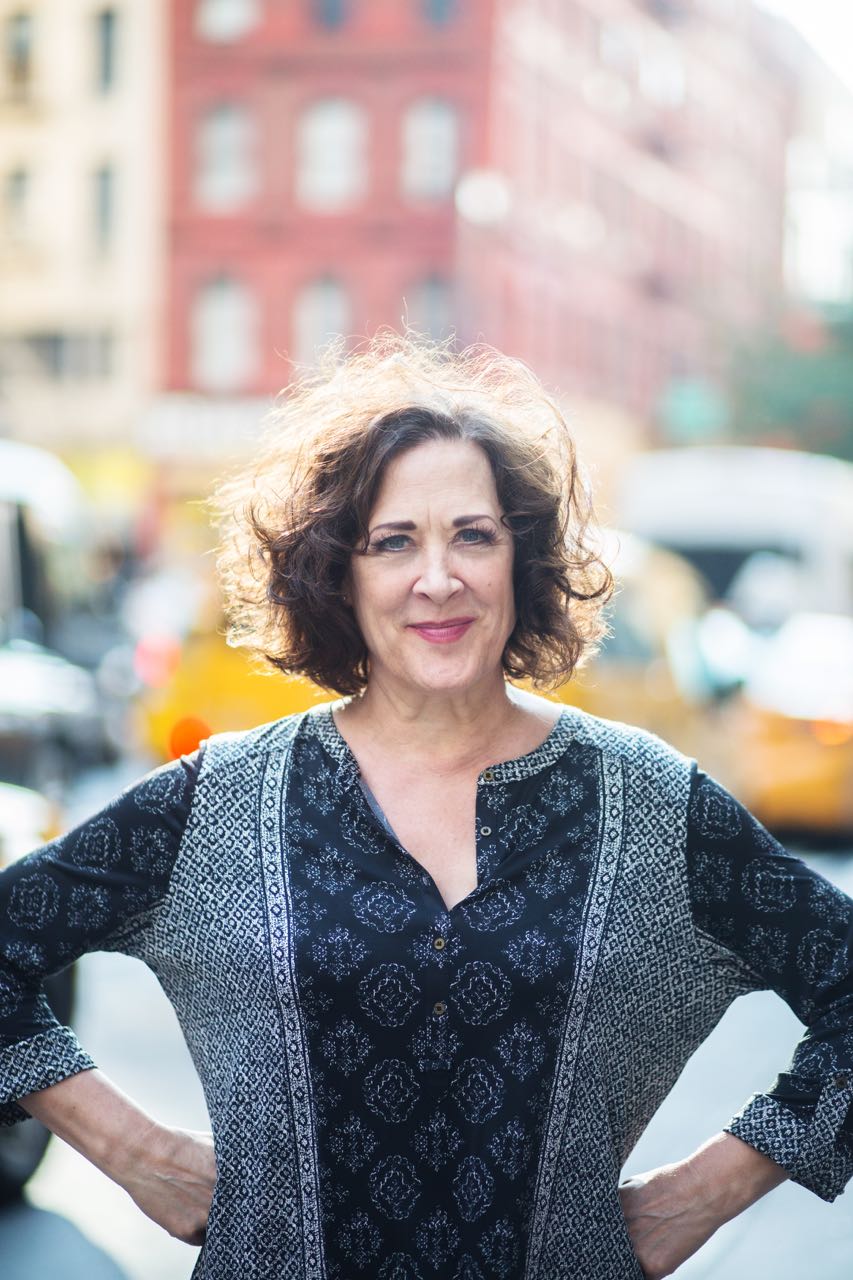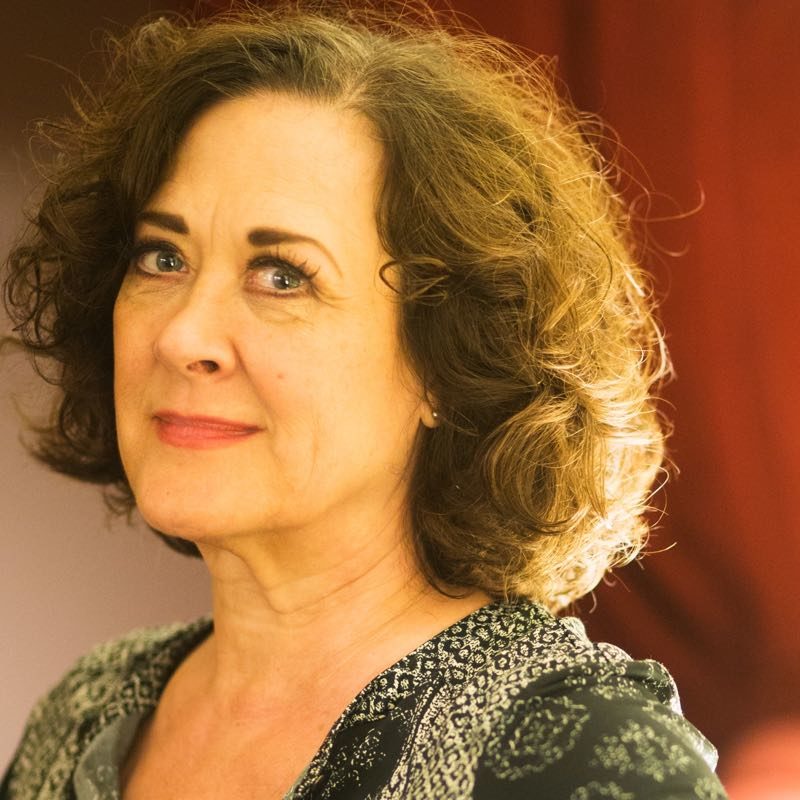An Interview with Karen Ziemba

Written by Victoria Myers
Photography by Tess Mayer
August 22nd, 2017
In 2000, Karen Ziemba won the Tony Award for Best Featured Actress in a Musical for her role in Contact, Susan Stroman’s dance musical. In her early 40s at the time, Karen, who was already an established performer in the theatre community and had been nominated for a Tony previously, became a name everyone should know. (In a summer camp production of A Chorus Line in my hometown of Akron, Ohio, where Karen went to college and studied dance, a piece of dialogue was chanced to be about her.) Since then, she has continued as a staple of the theatre community and has earned two more Tony Nominations for her work in Never Gonna Dance and Curtains. She’s currently appearing in Prince of Broadway, a musical revue that celebrates the work of Hal Prince. Between preview performances, we sat down with Karen to discuss her career, her start as a dancer, her transition into theatre, and more.
For Prince of Broadway, you’re playing different roles from different shows. Do you approach that more like you’re doing a concert or like you’re doing a full production of each piece?
The way Hal Prince has directed it and the way Susan Stroman has staged it, each individual number is very much as if it is picked up right out of the show, as if you had been in the show. Beowulf Boritt has built the sets to resemble the original designs—they got permission to do that from the original designers or from their estates—and the same thing with our costumes. That informs who you are and, for me as an actor, if you are doing it within the confines of that character in the show, it makes the story stronger. I like to think of it that I’m actually in Sweeney Todd, and if we continued on in Sweeney Todd, it could do that. Of course, it breaks into something else. I think that’s what makes the show very seamless too; it’s not just a bunch of people walking out there and singing a song from a different show, it’s a continuation of a story that’s being told, and then it morphs into another one.
You mentioned that the designs are based on the original sets and costumes, which is different from how a lot of actual revivals are done today. For you as a performer, how is it to be playing with the nostalgia factor?
Yes, it is very different than a revival. For example, when they do the stuff from Showboat, that was from the revival of Showboat, so those costumes were by William Ivey Long, but he is very much influenced by what came before. I feel all designers in the theatre are historians and want to pay homage to that. It’s very important that they keep things close to what the those styles were or what the original costume design was and put their own flair into it. I allow myself to be influenced by other actors that I admire. I don’t say, “I’m not going to do it like them,” or, “I’m not going to sing it like that,” because I’m myself. You can’t help but be yourself because you have your own unique voice, your own unique everything, but if there’s something that inspires you that someone else did that you’ve seen before, I say, “Let it funnel through you,” and then it comes out as your own. Everything’s a little bit different because Hal wanted to honor all his original ideas, but he wanted each specific performer that is in this show, Prince of Broadway, to bring their own thing to it. It’s sort of like a taste of the original, but it is all seen fresh and new because of the people playing the roles.
As an actor, what is your process like? When you first approach a character, what’s your entrypoint?
When you have this much material to learn, a lot of it is about getting all the technical stuff down. Getting down the correct notes that Stephen Sondheim wrote, the correct lyrics that he wrote or that John Kander wrote, giving them that respect. Then you take it from there. I have two different dialects other than my own American dialect that I speak and sing in this show. You work on that, and then later you maybe get a pair of shoes that the character’s going to wear and that makes you feel a certain way. Sometimes I wear high pumps, sometimes I wear flat little oxfords. Sometimes I wear a sort of army boot type thing. That informs so much of how you feel when you’re performing something or playing a character. It’s sort of like layers that you add on, but I always say start with the material first and learn it and feel comfortable with it as if it’s coming out of your being—like it’s something that you would just expound, you would just say it or sing it. All the other stuff just makes it that much more specific—the clothes, the hair, the accent, maybe the way you stylize it in your own voice. That’s kind of how I approach it.
Do you also do stuff like looking for ways that the character is similar to you, different from you, that sort of stuff?
I like to think that there are all different characters inside of us. Whether they’re the villain, whether they’re the good person, whether they’re the mom, whether they’re the sister, whether they’re old or young. We have all of that inside of us, especially myself because I’ve been around for a while, I’ve experienced all of that. Now I have that much more to bring to whatever I do because I’m that much more realized as a human being. I’ve just had more years at it. I use all of who I am to inspire me to play a character. That’s what’s so great about Prince of Broadway: we all get to play so many different characters and tackle these different feelings inside of ourselves.

You started as a dancer. I was wondering if you could talk some about how you transitioned into theatre?
As a kid, I’d always sung in choirs and choruses in school and in church. My grandmother was an opera singer, so there was a lot of music in my home. My parents loved jazz, they loved big orchestras, they loved going to the theatre that came through Detroit—that’s pretty much all we had, was some of the touring productions that came through Detroit, but they loved all that so we were very influenced as kids by that. I was always very confident singing and dancing in front of people, but the dance—the ballet and the tap and all that I’d done—I excelled at and I really enjoyed it. Because I started young and continued with it, it was just a real strength that I had. Being a dancer you’re very musical too, but I was also able to hear pitches correctly in my head, so that fueled being able to sing later in life.
I never really stopped singing, but when you’re a dancer and you want to be a professional dancer, it has to be your main focus. You can’t do a little of this and dabble a little here, you have to really go there. I did for a while. I danced with the Ohio Ballet, and it was wonderful to get to the point where I was actually dancing professionally, and yet it wasn’t really where I belonged. I felt that I couldn’t express myself fully just that way. I really wanted to add the singing and the telling of the jokes to my repertoire. But having the dance background has so helped me in this business because so many of the shows I’ve done I have danced in because I could, and because I was good at it.
I feel that dance has helped me just to be a stage animal in that when you enter a stage, you have to be able to fill up a theatre, and the dance makes you feel confident. It helps you walk, it helps your posture and everything. It also makes you disciplined. That’s a good thing to have in your back pocket when you get into the live theatre because so much is demanded of you and you are working so much as a team player, in many instances, so you have to know how that works. So, my dance background was very helpful in that way. I never regret it.
What was the transition like when you were moving from one world into the other? Did you ever have a moment where you were like, “Oh, this is kind of scary,” or anything like that?
It felt so comfortable to me to move into it that. No, I wasn’t scared. But as time went on, when I was doing more and more singing, I did realize that I had to think about how to get through eight shows a week. When I started working on Broadway it was like, this is not easy. You’ve got to stay healthy, you’ve got to take voice lessons and learn how to do it correctly so you’re not hurting yourself. That all became very important to me: the lessons and just staying in shape. To this day, something will happen to my voice and I’ll stop and go, “Oh my gosh, that’s what she [the voice teacher] was talking about.” It takes a while to get to the point where you go, “Oh, now I know what that means.” Sometimes you don’t get it right away, it takes years. Just like anything. You don’t learn to dance overnight. I did that for years too. Singing and acting, it’s all experience. If you keep doing it, and as we say in the show: work with the best. Not necessarily the most famous, but the best. That’s what doing the work is. That’s what being in the best place you can be is, because you are being influenced. I’ve been so fortunate with so many good people and to just watch and listen and try stuff and make a fool of myself and make a lot of mistakes too. Fall on your face, pick yourself up, and say yes to stuff too. That’s what I had to do in the theatre.
How did you navigate things like typecasting? It seems like that’s something that’s much more prevalent in musical theatre than in the dance world.
I don’t think it happens as much in the dance world. In dance, it is more about line and position and how it looks, and how you’re telling a story with your body and with movement and music. Whereas in theatre you are playing a certain character in a story. It’s much more specific. In theatre, it’s much more specific because the singing voices are going to be different, the age is different, maybe even the color of your hair, because Cinderella has to be this, or Cinderella has to be that. When Mary Martin played Nellie Forbush in South Pacific, she was a brunette, but then when they did the movie, Mitzi Gaynor was a blonde, so now mostly blondes play Nellie Forbush. People get an image in their mind of what it should be, so sometimes that typecasting does come into play. You just have to say, “Okay, it wasn’t my turn that time and maybe I’ll do it somewhere else, or just move on to the next thing.” That’s the thing: you just have to realize that it’s not because you’re not good at what you do, you’re just not the flavor of the month or what they’re looking for.
Contact was a huge success for you. What was it like having that success and spotlight on you at that age rather than at the stereotypical 25 years old?
I was very fortunate that being the age I was—in my 40s at that time—that Susan Stroman created that role for me and she had a story in mind and what she wanted it to be. The fact that I had the opportunity at that time in my life to have something fashioned for my personality and that somebody knew that I could make something of it [was great]. Having anything created for you is a thrilling thing to happen in the theatre, and it gives you that much more responsibility too. What was so wonderful about that show was that it was such a good show already, that it just buoyed what I was doing in it. It wasn’t like I was like the only piece of that puzzle. I was part of this whole beautiful evening, and my character was someone you cared about a lot because she went through a lot—she’s a very tragic and yet very funny figure. She’s very lovable, and yet you felt for her. I had to pull a lot of emotion from inside of me to create that character. And the evening itself was very moving and so people left after seeing those entire three acts just elated and wiser. It really gave you something to think about.
It was an unusual show. But it seems like it would be even more unusual if it was made in 2017. It seems like dance in musicals, and people who can do all of it, as a trend, has been going away. What’s your perspective on that?
I think any kind of musical story that’s well told and full of interesting things and just keeps you interested is worth seeing. I don’t think a musical has to be any particular thing. You could use puppets, you could use no speaking at all. It doesn’t matter. If it’s a story well told to music of some kind, it’s what it is. If it’s well done, I’m all for it. Contact was kind of in that ballpark, as it were.
Thinking back on the early/mid ’90s, when you began your career, what do you see as the biggest changes in the industry, both positive and negative, from then to now?
I think social media is positive and negative, in that we know so much more about what’s going on and yet it’s so fast that humans can’t move as fast as social media. It’s like everything has to get out right away. We still have to reflect and realize that we still do eight shows a week and we need that down time to reflect and recharge ourselves. Now it’s like we have to do the shows, take the pictures and do Instagram, get on Facebook, advertise yourself, promote yourself. It’s just a lot more work. I wouldn’t say that it’s necessarily negative, but there’s something that I do miss about people opening up a newspaper and being able to see pictures in your hand. That’s just because that’s what I remember growing up and my first half of my time in business.
It is difficult. Things are so expensive and the tickets are so expensive to see shows. I wish people could see more and that theatre was more for the people as opposed to just for one day a year or a special event or something. I think theatre changes people’s lives, and the more that they see, the more different stories, the more voices, it just opens your world. I wish more people could experience it.

What are your thoughts on the status of women in the industry in terms of parts for women, the amount of women on creative teams?
The more the better I think. I’ve worked with Susan Stroman, of course, all of my career, and I recently worked with a wonderful director, Liesl Tommy, on a Kander and Ebb piece, Kid Victory, at the Vineyard Theatre last year. She was phenomenal. I think that a woman’s perspective and her voice is very important and I think the more the better. Bring it on. We have a lot to say and we have different feelings about things that I think need to be channeled into telling these stories in the theatre. I’m glad to see many more names up on the boards.
As far as actors, just keep on keeping on. Any kind of roles are hard to come by. They say statistically, I think, there are more white men getting work in the theatre than anyone else, but I don’t concern myself with that as much as I just keep myself open to anything. I don’t want to stay the same person I was yesterday. I want to keep moving forward. If that means playing somebody’s grandmother, that’s what I’m going to do. They’re people too, they have a great story to tell.
Do you have a story or anecdote that encapsulates what the theatre community means to you?
The show that I’m working in right now, Prince of Broadway, is probably the greatest example of what really turns me on, in that my fellow cast members in this show are all stars in their own right. They might not be well known yet—some of us have done more than others, some of us have won Tony awards, some of us have been Tony nominees, and some are just starting out—but everyone is so fabulous. I’m not just saying this like, “Oh, come see my show.” It’s not about that. They are so gifted, and that I get to share the stage with these people is like being in a candy store. I sometimes back them up, and sometimes I’m out in front and they’re backing me up. It is like we are a rep company, and it is the most thrilling place to be, because in the theatre it’s all collaboration and nobody does it on their own. I think at this point in my life, being part of this show, I’m at the right place at the right time. I couldn’t be more thrilled. And working with Hal Prince, who’s almost 90 years old, and who has won 21 Tony Awards. On one side he will say, “That’s not right. Don’t do it like that, I don’t like that,” and on the other side he’ll say, “That was the most incredible performance you’ve ever given.” He has both sides to his personality and each one is meaningful and valid and you must heed and listen to it. It’s not always going to be fantastic, it’s not always going to be great, but you get both from him. His heart and soul is so much in the fabric of what I do and what we’re doing. He’s been so lauded for it and that I’m in his presence and he is part of my life now and part of what I do each night, is very exciting after growing up listening to his shows as a kid and dancing to them in the living room. That’s a cool place to be.

